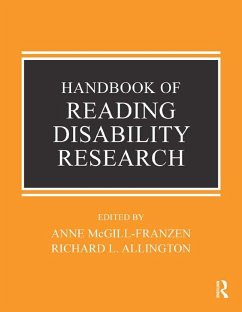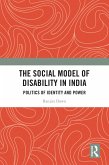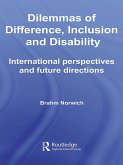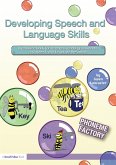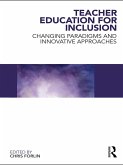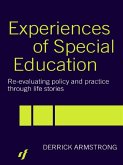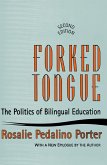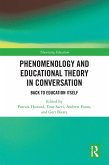Handbook of Reading Disability Research (eBook, PDF)
Redaktion: McGill-Franzen, Anne; Allington, Richard
137,95 €
137,95 €
inkl. MwSt.
Sofort per Download lieferbar

69 °P sammeln
137,95 €
Als Download kaufen

137,95 €
inkl. MwSt.
Sofort per Download lieferbar

69 °P sammeln
Jetzt verschenken
Alle Infos zum eBook verschenken
137,95 €
inkl. MwSt.
Sofort per Download lieferbar
Alle Infos zum eBook verschenken

69 °P sammeln
Handbook of Reading Disability Research (eBook, PDF)
Redaktion: McGill-Franzen, Anne; Allington, Richard
- Format: PDF
- Merkliste
- Auf die Merkliste
- Bewerten Bewerten
- Teilen
- Produkt teilen
- Produkterinnerung
- Produkterinnerung

Bitte loggen Sie sich zunächst in Ihr Kundenkonto ein oder registrieren Sie sich bei
bücher.de, um das eBook-Abo tolino select nutzen zu können.
Hier können Sie sich einloggen
Hier können Sie sich einloggen
Sie sind bereits eingeloggt. Klicken Sie auf 2. tolino select Abo, um fortzufahren.

Bitte loggen Sie sich zunächst in Ihr Kundenkonto ein oder registrieren Sie sich bei bücher.de, um das eBook-Abo tolino select nutzen zu können.
This Handbook brings together a wide range of research on reading disabilities. It is distinguished by its developmental perspective and by its extension of current discussion and thinking beyond a narrowly defined psychometric perspective.
- Geräte: PC
- mit Kopierschutz
- eBook Hilfe
- Größe: 2.88MB
Andere Kunden interessierten sich auch für
![The Social Model of Disability in India (eBook, PDF) The Social Model of Disability in India (eBook, PDF)]() Ranjita DawnThe Social Model of Disability in India (eBook, PDF)43,95 €
Ranjita DawnThe Social Model of Disability in India (eBook, PDF)43,95 €![Dilemmas of Difference, Inclusion and Disability (eBook, PDF) Dilemmas of Difference, Inclusion and Disability (eBook, PDF)]() Brahm NorwichDilemmas of Difference, Inclusion and Disability (eBook, PDF)46,95 €
Brahm NorwichDilemmas of Difference, Inclusion and Disability (eBook, PDF)46,95 €![Developing Speech and Language Skills (eBook, PDF) Developing Speech and Language Skills (eBook, PDF)]() Gwen LancasterDeveloping Speech and Language Skills (eBook, PDF)37,95 €
Gwen LancasterDeveloping Speech and Language Skills (eBook, PDF)37,95 €![Teacher Education for Inclusion (eBook, PDF) Teacher Education for Inclusion (eBook, PDF)]() Teacher Education for Inclusion (eBook, PDF)60,95 €
Teacher Education for Inclusion (eBook, PDF)60,95 €![Experiences of Special Education (eBook, PDF) Experiences of Special Education (eBook, PDF)]() Derrick ArmstrongExperiences of Special Education (eBook, PDF)50,95 €
Derrick ArmstrongExperiences of Special Education (eBook, PDF)50,95 €![Forked Tongue (eBook, PDF) Forked Tongue (eBook, PDF)]() Rosalie PorterForked Tongue (eBook, PDF)47,95 €
Rosalie PorterForked Tongue (eBook, PDF)47,95 €![Phenomenology and Educational Theory in Conversation (eBook, PDF) Phenomenology and Educational Theory in Conversation (eBook, PDF)]() Phenomenology and Educational Theory in Conversation (eBook, PDF)41,95 €
Phenomenology and Educational Theory in Conversation (eBook, PDF)41,95 €-
-
-
This Handbook brings together a wide range of research on reading disabilities. It is distinguished by its developmental perspective and by its extension of current discussion and thinking beyond a narrowly defined psychometric perspective.
Dieser Download kann aus rechtlichen Gründen nur mit Rechnungsadresse in A, B, BG, CY, CZ, D, DK, EW, E, FIN, F, GR, HR, H, IRL, I, LT, L, LR, M, NL, PL, P, R, S, SLO, SK ausgeliefert werden.
Produktdetails
- Produktdetails
- Verlag: Taylor & Francis eBooks
- Seitenzahl: 536
- Erscheinungstermin: 17. September 2010
- Englisch
- ISBN-13: 9781136980671
- Artikelnr.: 41065993
- Verlag: Taylor & Francis eBooks
- Seitenzahl: 536
- Erscheinungstermin: 17. September 2010
- Englisch
- ISBN-13: 9781136980671
- Artikelnr.: 41065993
- Herstellerkennzeichnung Die Herstellerinformationen sind derzeit nicht verfügbar.
Anne McGill-Franzen is Professor and Director of the Reading Center at the University of Tennessee. She was recipient of the International Reading Association Nila Banton Smith Award, co-recipient (with Dr. Richard L. Allington) of the IRA Albert J. Harris Award for research published in the field of reading disabilities, and the 2004 recipient of the IRA Dina Feitelson Award honoring an empirical study of language and literacy acquisition with clear implications for instruction. Dr. McGill-Franzen was a member of the Board of Directors of the National Reading Conference, serves on the editorial advisory boards of several major journals and was Technical Consultant for the UNESCO funded project on diagnostic teaching of reading in Kenya, Ghana, and Tanzania. Richard L. Allington is Professor of Education at the University of Tennessee. He has served or serves on the editorial advisory boards of Reading Research Quarterly, Review of Educational Research, Journal of Educational Psychology, Reading Teacher, Elementary School Journal, Journal of Literacy Research, and Remedial and Special Education. A past president of the National Reading Conference and the International Reading Association, he was co-recipient (with Dr. Anne McGill-Franzen) of the Albert J. Harris Award for contributions to improving professional understanding of reading/learning disabilities, and was elected to the Reading Hall of Fame.
Section 1: Pespectives on Reading Disability 1. Political Contexts of
Reading Disability 2. Historical Contexts for Understanding Reading
Disabilities 3. Poverty and Reading Disabilities 4. Ethnicity and Reading
Disabilities 5. Home Language and Reading Disabilities 6. Cognitive
Profiles and Reading Disabilities 7. Biological Characteristics and Reading
Disabilities 8. Neurosciences and Reading Disabilities 9. Language
Development and Reading Disabilities 10. Socio-cultural Aspects of Reading
Disabilities 11. Critical Theory and Reading Disabilities 12. Opportunity
to Learn and Reading Disabilities Section 2: Causes and Consequences of
Reading Disabilities 13. Individual Differences and Reading Disabilities
14. Home Differences and Reading Disabilities 15. Summer Setback and
Reading Disabilities 16. Persistence of Reading Disabilities 17. Gender and
Reading Disabilities 18. Drug Exposure and Reading Disabilities 19.
Aliteracy, Agency, and Identity Section 3: Assessing Reading Proficiency
20. Beliefs and Reading Assessment 21.Assessments for Different Goals 22.
Reading Ability as Developing Expertise 23. Traditions of Reading Diagnosis
24. Assessing Reading Disabilities in ELL Student 25. Culturally Relevant
Assessment of Reading Disabilities Section 4: Developmental Patterns of
Reading Proficiency and Difficulties 26. Emergent Literacy 27. Word
Recognition and Fluency 28. Vocabulary 29. Self-regulation 30.
Comprehension 31. Writing 32. Discussion 33. Motivation Section Five:
Developmental Interventions 34. Expert Classroom Instruction 35. Extended
Learning Beyond the Classroom 36. Interventions to Develop the Phonological
Systems 37. Interventions to Develop Decoding Proficiencies 38.
Interventions to Enhance Fluency and Rate of Reading 39. Interventions to
Enhance Vocabulary Development 40. Interventions to Enhance Narrative
Comprehension 41. Interventions to Enhance Informational Text Comprehension
42. Interventions to Develop e-text Learning Section 6: Studying Reading
Disabilities 43. Teacher Research 44. Single-subject and Case Study Designs
45. Experimental Research 46. Observational Research 47. Interpretive
Research 48. Large Database Analyses 49. Survey 50. Meta-analysis
Reading Disability 2. Historical Contexts for Understanding Reading
Disabilities 3. Poverty and Reading Disabilities 4. Ethnicity and Reading
Disabilities 5. Home Language and Reading Disabilities 6. Cognitive
Profiles and Reading Disabilities 7. Biological Characteristics and Reading
Disabilities 8. Neurosciences and Reading Disabilities 9. Language
Development and Reading Disabilities 10. Socio-cultural Aspects of Reading
Disabilities 11. Critical Theory and Reading Disabilities 12. Opportunity
to Learn and Reading Disabilities Section 2: Causes and Consequences of
Reading Disabilities 13. Individual Differences and Reading Disabilities
14. Home Differences and Reading Disabilities 15. Summer Setback and
Reading Disabilities 16. Persistence of Reading Disabilities 17. Gender and
Reading Disabilities 18. Drug Exposure and Reading Disabilities 19.
Aliteracy, Agency, and Identity Section 3: Assessing Reading Proficiency
20. Beliefs and Reading Assessment 21.Assessments for Different Goals 22.
Reading Ability as Developing Expertise 23. Traditions of Reading Diagnosis
24. Assessing Reading Disabilities in ELL Student 25. Culturally Relevant
Assessment of Reading Disabilities Section 4: Developmental Patterns of
Reading Proficiency and Difficulties 26. Emergent Literacy 27. Word
Recognition and Fluency 28. Vocabulary 29. Self-regulation 30.
Comprehension 31. Writing 32. Discussion 33. Motivation Section Five:
Developmental Interventions 34. Expert Classroom Instruction 35. Extended
Learning Beyond the Classroom 36. Interventions to Develop the Phonological
Systems 37. Interventions to Develop Decoding Proficiencies 38.
Interventions to Enhance Fluency and Rate of Reading 39. Interventions to
Enhance Vocabulary Development 40. Interventions to Enhance Narrative
Comprehension 41. Interventions to Enhance Informational Text Comprehension
42. Interventions to Develop e-text Learning Section 6: Studying Reading
Disabilities 43. Teacher Research 44. Single-subject and Case Study Designs
45. Experimental Research 46. Observational Research 47. Interpretive
Research 48. Large Database Analyses 49. Survey 50. Meta-analysis
Section 1: Pespectives on Reading Disability 1. Political Contexts of
Reading Disability 2. Historical Contexts for Understanding Reading
Disabilities 3. Poverty and Reading Disabilities 4. Ethnicity and Reading
Disabilities 5. Home Language and Reading Disabilities 6. Cognitive
Profiles and Reading Disabilities 7. Biological Characteristics and Reading
Disabilities 8. Neurosciences and Reading Disabilities 9. Language
Development and Reading Disabilities 10. Socio-cultural Aspects of Reading
Disabilities 11. Critical Theory and Reading Disabilities 12. Opportunity
to Learn and Reading Disabilities Section 2: Causes and Consequences of
Reading Disabilities 13. Individual Differences and Reading Disabilities
14. Home Differences and Reading Disabilities 15. Summer Setback and
Reading Disabilities 16. Persistence of Reading Disabilities 17. Gender and
Reading Disabilities 18. Drug Exposure and Reading Disabilities 19.
Aliteracy, Agency, and Identity Section 3: Assessing Reading Proficiency
20. Beliefs and Reading Assessment 21.Assessments for Different Goals 22.
Reading Ability as Developing Expertise 23. Traditions of Reading Diagnosis
24. Assessing Reading Disabilities in ELL Student 25. Culturally Relevant
Assessment of Reading Disabilities Section 4: Developmental Patterns of
Reading Proficiency and Difficulties 26. Emergent Literacy 27. Word
Recognition and Fluency 28. Vocabulary 29. Self-regulation 30.
Comprehension 31. Writing 32. Discussion 33. Motivation Section Five:
Developmental Interventions 34. Expert Classroom Instruction 35. Extended
Learning Beyond the Classroom 36. Interventions to Develop the Phonological
Systems 37. Interventions to Develop Decoding Proficiencies 38.
Interventions to Enhance Fluency and Rate of Reading 39. Interventions to
Enhance Vocabulary Development 40. Interventions to Enhance Narrative
Comprehension 41. Interventions to Enhance Informational Text Comprehension
42. Interventions to Develop e-text Learning Section 6: Studying Reading
Disabilities 43. Teacher Research 44. Single-subject and Case Study Designs
45. Experimental Research 46. Observational Research 47. Interpretive
Research 48. Large Database Analyses 49. Survey 50. Meta-analysis
Reading Disability 2. Historical Contexts for Understanding Reading
Disabilities 3. Poverty and Reading Disabilities 4. Ethnicity and Reading
Disabilities 5. Home Language and Reading Disabilities 6. Cognitive
Profiles and Reading Disabilities 7. Biological Characteristics and Reading
Disabilities 8. Neurosciences and Reading Disabilities 9. Language
Development and Reading Disabilities 10. Socio-cultural Aspects of Reading
Disabilities 11. Critical Theory and Reading Disabilities 12. Opportunity
to Learn and Reading Disabilities Section 2: Causes and Consequences of
Reading Disabilities 13. Individual Differences and Reading Disabilities
14. Home Differences and Reading Disabilities 15. Summer Setback and
Reading Disabilities 16. Persistence of Reading Disabilities 17. Gender and
Reading Disabilities 18. Drug Exposure and Reading Disabilities 19.
Aliteracy, Agency, and Identity Section 3: Assessing Reading Proficiency
20. Beliefs and Reading Assessment 21.Assessments for Different Goals 22.
Reading Ability as Developing Expertise 23. Traditions of Reading Diagnosis
24. Assessing Reading Disabilities in ELL Student 25. Culturally Relevant
Assessment of Reading Disabilities Section 4: Developmental Patterns of
Reading Proficiency and Difficulties 26. Emergent Literacy 27. Word
Recognition and Fluency 28. Vocabulary 29. Self-regulation 30.
Comprehension 31. Writing 32. Discussion 33. Motivation Section Five:
Developmental Interventions 34. Expert Classroom Instruction 35. Extended
Learning Beyond the Classroom 36. Interventions to Develop the Phonological
Systems 37. Interventions to Develop Decoding Proficiencies 38.
Interventions to Enhance Fluency and Rate of Reading 39. Interventions to
Enhance Vocabulary Development 40. Interventions to Enhance Narrative
Comprehension 41. Interventions to Enhance Informational Text Comprehension
42. Interventions to Develop e-text Learning Section 6: Studying Reading
Disabilities 43. Teacher Research 44. Single-subject and Case Study Designs
45. Experimental Research 46. Observational Research 47. Interpretive
Research 48. Large Database Analyses 49. Survey 50. Meta-analysis
